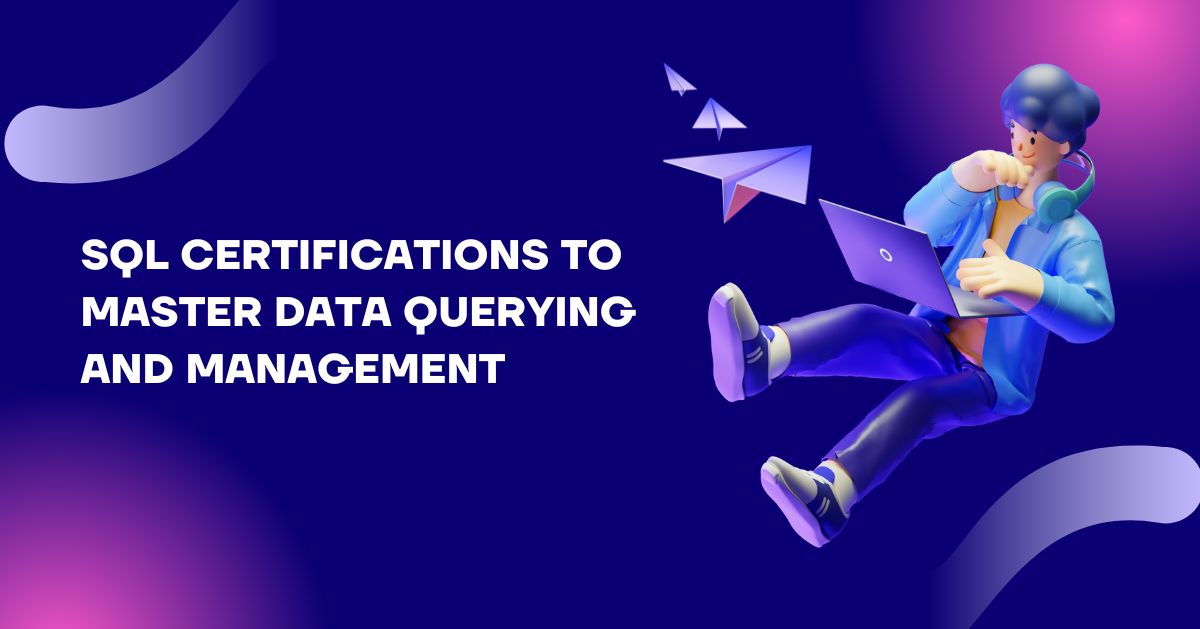SQL Certifications to Master Data Querying and Management

One of the top skills for data professionals is Structured Query Language (SQL). It is for data querying, database management, and data analysis in a wide range of industries. It can be particularly beneficial for professionals working in the fields of data science, business intelligence, software development, and database administration who want to advance their careers by obtaining an SQL Certification.
In this article, we will discuss the top SQL certifications and their benefits, career prospects, and how these courses help professionals in data querying and management as well as data science.
Why Do SQL Certifications Matter?
SQL certifications validate an individual’s ability to:
- Write, modify, and manage SQL queries
- Optimize database performance
- Work with relational databases like MySQL, PostgreSQL, Microsoft SQL Server, and Oracle
- Extract and analyze data for business insights
[ Read About: SSIS 816: Definition, Background, and Capabilities ]
1. High Demand for SQL Skills
- SQL is a foundational skill in data science, data engineering, database administration, and business intelligence.
- Businesses need such experts who can manage, analyze, interpret large datasets.
2. Career Advancement and Salary Growth
- SQL-certified professionals earn higher salaries and have better job prospects.
- The average salary for SQL-related roles:
- Database Administrators – $90,000+ per year
- Data Analysts – $75,000+ per year
- Data Engineers – $100,000+ per year
3. Integration with Data Science Courses
- Data science courses focus to a great extent on SQL, as it allows professionals to query, clean, and analyze data.
- Certification causes to build expertise in the area of machine learning, AI, and big data analytics.
Top SQL Certifications to Consider
1. Microsoft Certified: Azure Database Administrator Associate
- Best for: Database administrators and cloud professionals
- Skills Covered:
- Managing SQL Server databases
- Configuring security and optimizing performance
- Automating database tasks using Azure services
- Exam: DP-300
- Certification Body: Microsoft
2. Oracle Database SQL Certified Associate
- Best for: Professionals working with Oracle databases
- Skills Covered:
- Writing SQL queries for data retrieval
- Managing database objects and user access
- Optimizing query performance
- Exam: 1Z0-071
- Certification Body: Oracle
3. IBM Certified Database Associate – DB2
- Best for: Data professionals using IBM DB2
- Skills Covered:
- SQL fundamentals and database management
- Working with DB2 databases for business applications
- Performance tuning and security management
- Exam: C2090-320
- Certification Body: IBM
4. MySQL 8.0 Database Administrator Certification
- Best for: Developers and database administrators using MySQL
- Skills Covered:
- Writing efficient SQL queries
- Managing and securing MySQL databases
- Performance optimization and troubleshooting
- Exam: 1Z0-908
- Certification Body: Oracle
5. PostgreSQL Certified Professional Certification
- Best for: Professionals working with PostgreSQL databases
- Skills Covered:
- Advanced SQL querying
- Database administration and tuning
- Backup and recovery strategies
- Exam: PostgreSQL Professional Exam
- Certification Body: EnterpriseDB
Who Should Pursue an SQL Certification?
- Beginner students and graduates seeking foundational knowledge in SQL
- Database administrators who manage enterprise databases
- Developers using databases in their applications
- SQL validation of ML models by data scientists
Steps to Earn an SQL Certification
1. Choose the Right Certification
- Select an SQL certification based on your career goals.
- Consider factors like exam difficulty, certification cost, and industry demand.
2. Enroll in a Training Program
- Many platforms offer SQL training, including:
- Microsoft Learn
- Oracle University
- IBM Training
- Coursera
- Udemy
3. Gain Hands-on Experience
- Practice SQL queries using MySQL, PostgreSQL, SQL Server, or Oracle databases.
- Work on real-world datasets to strengthen query-writing skills.
4. Prepare for the Exam
- Study official exam guides and sample questions.
- Take mock tests to assess knowledge before the exam.
5. Pass the Exam and Earn Certification
- Complete the certification exam and obtain your SQL credential.
- Use the certification to enhance your resume and job applications.
SQL Certifications and Their Role in Data Science Courses
| Certification | Best For | Relevance to Data Science |
| Microsoft Certified: Azure Database Administrator | Cloud database management | Working with Azure data services for data science applications |
| Oracle Database SQL Certified Associate | SQL developers and DBAs | Managing structured data for analysis |
| IBM Certified Database Associate – DB2 | Data professionals using DB2 | Optimizing SQL queries for big data analytics |
| MySQL 8.0 Database Administrator Certification | Developers and DBAs | Managing structured data for analytics |
| PostgreSQL Certified Professional | Open-source database professionals | Working with PostgreSQL for machine learning applications |
Job Opportunities with SQL Certifications
Top Job Roles
- SQL Developer
- Data Analyst
- Business Intelligence Analyst
- Database Administrator
- Data Engineer
- Data Scientist
Industries That Require SQL Skills
- IT & Software Development
- Finance & Banking
- Healthcare & Pharmaceuticals
- E-commerce & Retail
- Logistics & Supply Chain
Top Companies Hiring SQL Professionals
- Microsoft
- Amazon
- IBM
- JPMorgan Chase
- Walmart
Is an SQL Certification Worth It?
Benefits of SQL Certifications
- Boosts employment chances in data-centric fields.
- Increases compensation potential and opportunities for advancement.
- Offers practical experience in database management.
- Extends the ability of data queries for BI and analytics.
Conclusion
SQL certifications are essential for professionals who want to study and develop their knowledge in the area of data querying, database management and analytics. SQL certifications pave the way for high-paying job roles and career advancements for new graduates, working professionals, or individuals aspiring to upskill.
Combining SQL knowledge with courses in data science allows professionals to build up their analytical skills, and increase their competitiveness in the job market.
